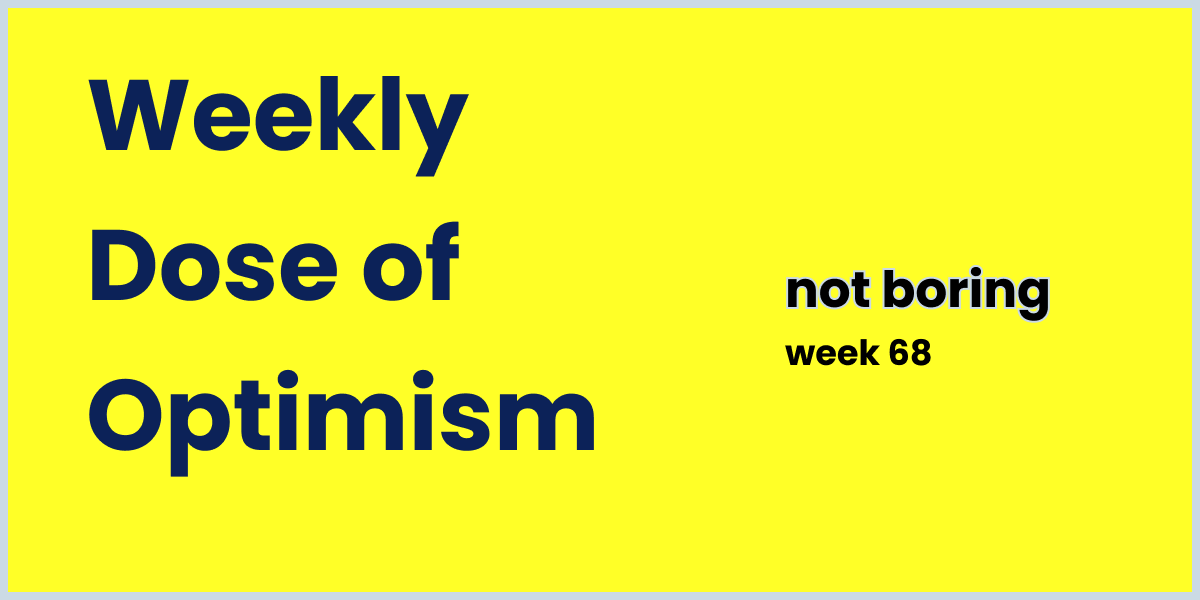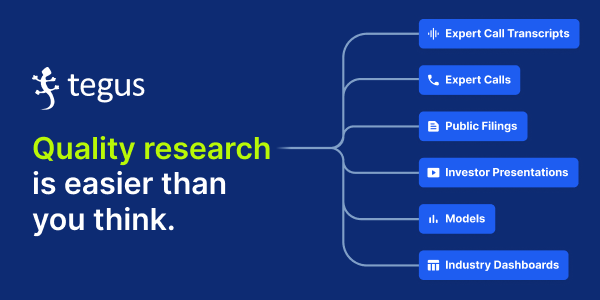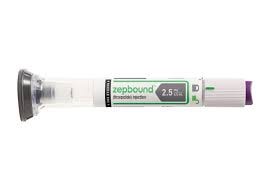Not Boring by Packy McCormick - Weekly Dose of Optimism #68
Hi friends 👋, Happy Friday and welcome back to our 68th Weekly Dose of Optimism. On Tuesday, Packy predicted that tech is going to get much bigger thanks to advancements in dexterity, energy, and intelligence. This week, we’ll share a bunch of stories that we can, at least directionally, back up his prediction. Let’s get to it. Today’s Not Boring (and Age of Miracles) is Sponsored by… Tegus Imagine a day where every minute of your research is well spent. Where information gives you the freedom to be bold. Tegus is research without all the tedious hunting, calling, parsing, and pasting. You get access to expert calls, custom financial models, and public filing data— all in one place. The time for a more powerful perspective is here. Do what you do best, even better. (1) OpenAI’s first developer conference
OpenAI held its first developer day earlier this week, and it announced a bunch of new products and features that we think meaningfully move the ball forward on AI. The primary new product announced was Custom GPT — which allows anyone to create their own version of GPT using unique instructions and extra knowledge. For example, we pretty easily spun up NotBoringGPT - a custom model based on what GPT could scrape from the web, a couple of recent essays that we uploaded, and a few sentences of additional instruction. Here’s a video on X of Altman’s demo of the product. And while it’s easy to predict that this new product will kill a hundred startups, it’s harder to predict the implications of allowing anyone — technical or non-technical — to build their own GPT. On top of Custom GPT, OpenAI released a bunch of features that make the core product better: speed, longer context windows, more up-to-date, etc. Tech Is Going to Get Much Bigger was researched and edited with ChatGPT; the longer context windows are a godsend. As we saw with the initial launch of ChatGPT, UI and user experience make a difference, and OpenAI is doubling down on that. Ben Thompson wrote a good post on this on Stratechery. OpenAI is also demonstrating that AI can get really, really useful long before they or someone else achieves AGI. OpenAI devday seems to have accomplished its goal, which is to say, developers seem very excited about building with ChatGPT right now. Altman Xeeted this on Wednesday: “usage of our new features from devday is far outpacing our expectations.” But the definition of developer has changed. This isn’t F8 or re:Invent. Anyone — even me — can develop at custom model in ChatGPT. (2) In a U.S. First, a Commercial Plant Starts Pulling Carbon From the Air Brad Plumer for The New York Times
Heirloom Carbon Technologies launched the first commercial plant in the U.S. for direct air capture (DAC) with a capacity to absorb 1,000 tons of CO2 annually, equivalent to emissions from about 200 cars. Only 200 cars? Yes, we hear you. We’ve written a bunch about DAC — its promises and its limitations — largely in the context of Frontier, the advanced market commitment (AMC) from the likes of Stripe and McKinsey, to accelerate carbon removal. The point of the AMC is to ensure demand for new technologies in which the offering is not yet competitive. Why do this? Not altruism. But to encourage builders to chase down technological advancements that can eventually make the product competitive. AMCs aren’t the only mechanisms by which these types of projects get funded. Heirloom, for example, has benefitted from government aid and a long-term contract with Microsoft in order to get its commercial plant live. The idea here is that AMCs, companies, and governments can give projects a boost as they ride the long experience curve down to true market capitalism. We’ve seen it play out in EVs, solar, rockets, and a number of other markets. Time will tell for DACs — 200 cars this year, but how many cars in 2033? (3) FDA Approves Lilly's Zepbound™ (tirzepatide) for Chronic Weight Management From Lilly
Another week, another development in obesity drugs. Lilly’s Zepbound, which is already sold by Eli Lilly as the diabetes treatment Mounjaro, was approved by the F.D.A. for weight loss. Patients that used Zepbound lost an average of 18% body weight, compared to just 15% for patients taking Wegovy. And while not approved for these conditions, patients of Zepbound also experienced lower cholesterol and reductions in blood pressure. We’ve shared our perspective on weight loss GLP-1’s previously but it’s something along the lines of: obesity is a chronic disease, a certain percentage of people are never going to be able to cure that disease through behavioral changes, and GLP-1s, while still early, seem to provide a reasonably safe and effective treatment method. Plus, GLP-1s could play an important role in the future treatment of a bunch of other diseases, of course diabetes, but also cardiovascular and neurodegenerative diseases as well. And it seems to make people less addicted and compulsive generally, for better or worse. As for Zepound specifically, we don’t have a dog in this fight. The more legit options on the market, the better it is for patients. (4) Bangladesh strikes a blow against lead poisoning From The Economist
As many as 5.5 million people die prematurely each year from lead poisoning — that’s more than HIV, malaria, and car accidents combined. And while much progress has been made on this over the last couple of decades — namely the phasing out of leaded gasoline — it’s still a major problem in some developing countries. In Bangladesh, for example, researchers discovered that lead-adulterated turmeric, a common cooking spice, which was being pigmented with lead chromate to enhance its color for better sales, resulted in high blood lead levels across the population. But thanks to a combination of education and strict enforcement, Bangladesh has completely wiped lead from its turmeric supplies. In 2019, prior to the campaign, 47% of turmeric samples contained lead. In 2021, that number had dropped to 0%. The solution was two-pronged: The International Center for Diarrheal Disease Research, Bangladesh, and government officials initiated an education campaign — fliers, news spots, etc. — to inform the public about the dangers of lead and the illegality of adulteration. They then conducted raids with X-ray fluorescence analyzers to detect lead in turmeric and imposed fines on sellers with adulterated products. The result: sellers stopped using lead chromate in their turmeric in order to boost sales. Free markets are great, but sometimes you need a bit of regulation to ensure that your curry isn’t being poisoned, you know?  Packy here. Yesterday, Humane showcased its long-anticipated ai pin in a 10 minute demo video. The ai pin starts at $699 + a $24/month fee that includes access to not-apps from a growing number of partners and cell service. Reactions have been mixed. On the one hand, people are excited about the first AI-first hardware device, and it seems smooth! On the other, people are skeptical about the need for a new device when Apple exists. Personally, I’m excited about it. This has been years of work in the making. You can tap a button on your shirt and get questions answered. You can point it at your food and get nutrition facts. You can point it at things in the real world and get more information. You can record conversations and videos of things happening around you instead of holding up your phone at a concert (with a warning light for privacy). It will be cool to play with, get better with time, and give a bunch of other people ideas for new ways to interact with this new machine intelligence. This is a first gen product in a totally new form factor — remember when the early iPhone couldn’t make calls because of the antenna? — so I’m sure there will be a lot of lessons learned. But you gotta love that, 16 years after the iPhone launched, people are experimenting with new hardware products again. Bonus: Age of Miracles Episode 4  We’re baaaaaaaaaaack. Listen to Age of Miracles Episode 4 on Spotify, Apple, or wherever you listen. This week’s is my favorite episode we’ve released to date because we dive into the startup side of nuclear and do a little strategy breakdown on a couple of startups working to manufacture small modular reactors: Last Energy and Blue Energy. Blue Energy is planning to work with existing shipyards to print out reactors like ships, float them around the world to wherever they’re needed, and float them offshore. Bringing back some of the wildest ideas from the 1970s and 80s. Last Energy is building 20 megawatt reactors based on existing designs — “We pride ourselves on being the least innovative nuclear company out there.” — and focusing on the manufacturing process to ultimately make 10,000 of them a year. In both cases, the goal is to bring nuclear plants down the types of learning curves that solar has in order to make it as cheap as its cost physics suggest it could be. There will, of course, be challenges, but the founders are aware of them and have crafted strategies to give them the best shot at overcoming them. This is a fun one. Give it a listen. That’s all for this week. If you have some time this weekend, check out Tegus. We’ll be back in your inbox on Tuesday. Thanks for reading, Dan + Packy |
Older messages
Tech is Going to Get Much Bigger
Wednesday, November 8, 2023
What happens when energy, intelligence, and labor get cheap?
Weekly Dose of Optimism
Friday, November 3, 2023
Mini Lasers, Giant Reactors, DNA Origami, AoM e3, AI EO, Palmer
Medicine's Endgame
Tuesday, October 31, 2023
The past, present, and future of cell-based therapy
Age of Miracles
Friday, October 27, 2023
Launching Season 1: Nuclear Energy
Weekly Dose of Optimism #64
Tuesday, October 24, 2023
Age of Miracles, Solar Resolution, Sturgeon, Purple Cloth, Charles Feeney, Loom
You Might Also Like
🔮 $320B investments by Meta, Amazon, & Google!
Friday, February 14, 2025
🧠 AI is exploding already!
✍🏼 Why founders are using Playbookz
Friday, February 14, 2025
Busy founders are using Playbookz build ultra profitable personal brands
Is AI going to help or hurt your SEO?
Friday, February 14, 2025
Everyone is talking about how AI is changing SEO, but what you should be asking is how you can change your SEO game with AI. Join me and my team on Tuesday, February 18, for a live webinar where we
Our marketing playbook revealed
Friday, February 14, 2025
Today's Guide to the Marketing Jungle from Social Media Examiner... Presented by social-media-marketing-world-logo It's National Cribbage Day, Reader... Don't get skunked! In today's
Connect one-on-one with programmatic marketing leaders
Friday, February 14, 2025
Enhanced networking at Digiday events
Outsmart Your SaaS Competitors with These SEO Strategies 🚀
Friday, February 14, 2025
SEO Tip #76
Temu and Shein's Dominance Is Over [Roundup]
Friday, February 14, 2025
Hey Reader, Is the removal of the de minimis threshold a win for e-commerce sellers? With Chinese marketplaces like Shein and Temu taking advantage of this threshold, does the removal mean consumers
"Agencies are dying."
Friday, February 14, 2025
What this means for your agency and how to navigate the shift ͏ ͏ ͏ ͏ ͏ ͏ ͏ ͏ ͏ ͏ ͏ ͏ ͏ ͏ ͏ ͏ ͏ ͏ ͏ ͏ ͏ ͏ ͏ ͏ ͏ ͏ ͏ ͏ ͏ ͏ ͏ ͏ ͏ ͏ ͏ ͏ ͏ ͏ ͏ ͏ ͏ ͏ ͏ ͏ ͏ ͏
Is GEO replacing SEO?
Friday, February 14, 2025
Generative Engine Optimization (GEO) is here, and Search Engine Optimization (SEO) is under threat. But what is GEO? What does it involve? And what is in store for businesses that rely on SEO to drive
🌁#87: Why DeepResearch Should Be Your New Hire
Friday, February 14, 2025
– this new agent from OpenAI is mind blowing and – I can't believe I say that – worth $200/month





